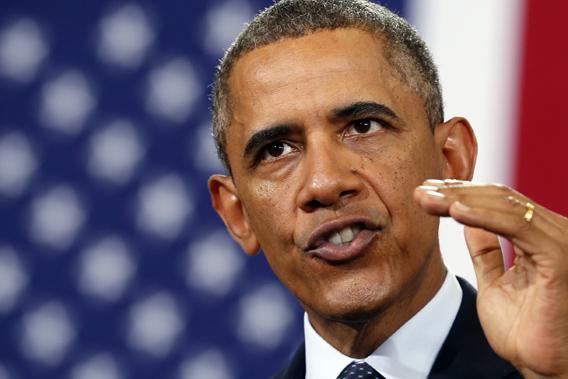On July 9, a small, bipartisan group of congressmen met with their unofficial saints. Alan Simpson and Erskine Bowles were back together, pitching them in private about the revised version of their deficit reduction plan, and about how a grand bargain on spending really could still happen. Really.
“What a wonderful group!” remembers Simpson. “They work with each other. They talk to each other. You know that [Montana Sen. Max] Baucus and [Michigan Rep. Dave] camp are working on tax reform already, so we don’t need to prod them. We say, pull up a chair. We don’t serve any bullshit or mush. We’ll tell you where your country is.”
Unexpectedly, July was shaping up to be a good month for the austerity crowd. They’d been losing their best argument, watching the deficit fall from $1.1 trillion last year to $642 billion this year. The grim experiences of nations committed to actual austerity programs hadn’t helped that group, either. But the relevant parties were listening, and a posse of Senate Republicans was meeting with White House negotiators about a possible bargain. The White House is still open to the package of tax hikes and entitlement cuts it proposed in the last few showdowns—$400 billion in Medicare cuts, maybe chained CPI.
The last few times the deal-makers got here, they were undone by conservatives who didn’t want to bend on taxes. Things change: The austerity crowd may be undone, one more time, by conservatives who view the coming vote to fund the government—deadline Sept. 30—as the “last chance” to defund the Affordable Care Act.
Completely predictable, and yet it came out of nowhere. Last week, Utah Sen. Mike Lee unveiled a letter co-signed by 11 colleagues, pledging that they “will not support any continuing resolution or appropriations legislation that funds further implementation or enforcement of Obamacare.” North Carolina Rep. Mark Meadows Xeroxed that letter in the House, and quickly made 66 foxhole buddies.
The rest of the party—and keep in mind, it’s a party wholly committed to destroying Obamacare—has reacted with a combustible mix of disgust and panic. The continuing resolution (and after that, the fight over the debt limit) was an opportunity to force the White House to deal on entitlements. “The one thing that we have achieved is that we have actually cut discretionary spending through sequestration and the Budget Control Act,” Oklahoma Sen. Tom Coburn pointed out. “That’s one thing we’ve done great for the country, and you’re going to put that at risk trying to achieve something that is impossible for us to achieve.”
But the Republicans demanding a repeal vote are changing the conversation. In their corner, demanding as a pH test of conservatism, are the Club for Growth, Heritage Action, FreedomWorks, and the other usual suspects. Every Republican discussed as a credible 2016 candidate (Rubio, Cruz, Paul) signed the letter. They’ve sold it to conservative media as much as they’ve sold it to anybody else.
“We need the American people to stand with us in demanding that not another cent be spent on implementing ObamaCare,” wrote Rubio in an editorial for RedState.com. “At that point, the President will have a decision to make: sign it and keep the government open, or veto it and shut down the government.”
Cruz spent Monday in conversation with conservatives, starting with Fox News and continuing with Glenn Beck and Missouri radio talker Dana Loesch. “If we surrender, as Republicans are so good at, it’s guaranteed we will not win this fight,” he said on Fox. Talking to Loesch, he reiterated what was written in the letter, the claim that the delay in the employer mandate meant that Senate Republicans had no duty to fund the whole law. “There is a powerful defeatist approach among Republicans in Washington,” he told her. “The House of Representatives should pass a continuing resolution that funds the entire government, except Obamacare.”
In the right context, the defund-Obamacare-first Republicans might actually enable a bargain. Most deals begin with unreasonable demands and end in the center. Move the center to the right and, theoretically, you end up closer to that side than to the president’s side.
One problem with that: Republicans already tried to do this. They were in a stronger political position. They failed. In 2011, the new Republican Congress tried to defund Obamacare, and for their troubles the president mocked them. “I said to them, ‘Let me tell you something: I spent a year and a half getting healthcare passed,’ ” said Obama at an April 2011 fundraiser. “‘I had to take that issue across the country and I paid significant political costs to get it done. The notion that I’m going to let you guys undo that in a six-month spending bill?’ I said, ‘You want to repeal health care? Go at it. We’ll have that debate. You’re not going to be able to do that by nickel-and-diming me in the budget. You think we’re stupid?’ ”
So the threat to Obamacare doesn’t actually scare the left. To them, it feels like the demands conservatives have made on taxes in every round of the Debt Wars. Their refusal to raise taxes, even on Social Security, has effectively checkmated the administration on its entitlement plans. The shrinking deficit has made it easier for progressives to defend entitlements as they are.
The grand-bargainers are well aware of that. “It’s just great that the deficit is down,” says Alan Simpson. “That’s what you hope for—get the deficit down, get more people back to work. Hell, any good news is good news!” His struggle, he says, is to get members of Congress to worry about the 30-year threat of entitlement liabilities as much as they worried about a Greece-like collapse in 2011 or 2012. Changing the discussion to Obamacare? That’s short-term. “If you begin to draw the line in the sand, I doubt the other folks will go along with that. There’ll be a great orgy of discussion then they’ll kick the can down the road.”
